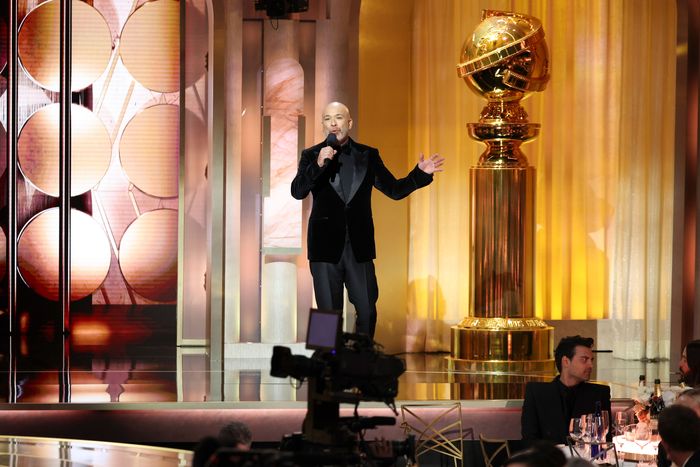
Hosting the Golden Globes is a tough gig. As Andy Samberg noted after co-hosting the show with Sandra Oh in 2019, the room is very “boozy” and notoriously difficult to cull: “At home, I think you can tell it’s loud, but imagine that times ten.” Add to this the status of the attendees and their tendency to err on the side of the self-serious — not to mention the pressure of the massive at-home audience scrutinizing the performance live — and it’s obvious why many prominent comedians have turned down the gig in recent years. It’s just not worth the trouble.
When comedian Jo Koy hosted the Golden Globes on January 7, these difficulties were compounded by how ill prepared he was. He noted as much early in his opening monologue after the first perceived signs of trouble. “Yo, I got the gig ten days ago,” he said defensively. “You want a perfect monologue? Shut up … I wrote some of these, and they’re the ones you’re laughing at.” Koy was bombing in the room and trying to win back the audience by acknowledging it — a common comedian tactic — except not until he broke from his script and started blaming his writers did the bomb begin to feel so palpable on TV.
Comedians have tanked at the Golden Globes before but none quite as spectacularly as Koy. Ricky Gervais’s jokes failed in the room to varying extents each of the five times he hosted, but he was aware this would happen. By adopting the persona of an antagonist and then continuously responding to tepid audience reactions with assurances of “I don’t care,” he ensured his jokes were better received by television viewers. (As a rule, TV productions like the Globes charitably depict in-person audience reactions so those at home rarely know the full extent of a bomb.) Jerrod Carmichael’s 2023 hosting stint was hardly a universal success, but by establishing a contemplative tone up top and using it to reflect on the ceremony’s return to television — it had briefly been taken off the air because of a diversity scandal at the Hollywood Foreign Press Association — he was able to maintain his gravitas when his jokes didn’t land. More important, both hosts stayed the course.
Chalk some of this up to the misguided selection of Koy in the first place. He’s not a crossover star, so the audience inside the Beverly Hilton didn’t extend him instant goodwill the way they would a more established celebrity like Samberg. And as a stand-up, he’s not known for projecting ambivalence toward his audience as Gervais does. He rose to popularity making in-jokes that play on his Filipino heritage, and even as his subject matter and audience have widened, he continues to vie for connection and relatability. He plays to big theaters and small arenas full of supportive fans who have come out to see him, and he sells (often) unrevolutionary premises with broad physicality. He was never going to succeed standing still onstage and antagonizing an audience of celebrities to their faces. He wasn’t able to win their confidence or demonstrate that he didn’t care about their approval when he failed to do so.
If blaming his writers was the first sign that Koy had entered panic mode, he went into full flop-sweat open-mic mode thereafter. He lost his timing, began repeating punch lines (like one about how Succession taught him that billionaires should “pull out”) as if to bludgeon the audience into laughing, and backed away from jokes instead of confidently standing by them. A tame joke about Taylor Swift that should have gone over fine (“The big difference between the Golden Globes and the NFL: On the Golden Globes, we have fewer camera shots of Taylor Swift”) landed with a thud, in part because Koy laughed nervously during its delivery. What might have been a funny reaction shot of an unamused Swift taking a sip from her glass was undercut when Koy awkwardly added, “I’m sorry about that.”
Was it the strongest joke on paper? No. But Koy didn’t even give it a chance to succeed — a microcosm of the night with all the host’s best intentions overshadowed by his inability to commit to the bit.


